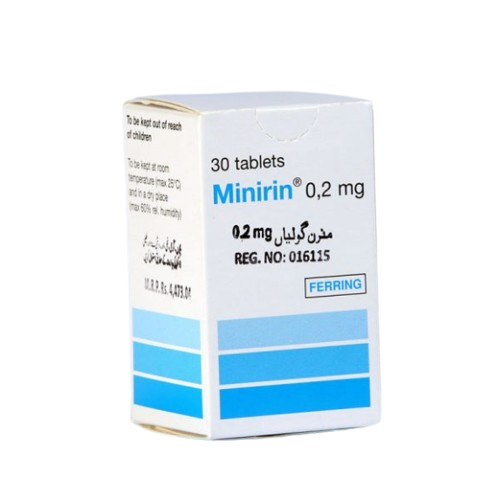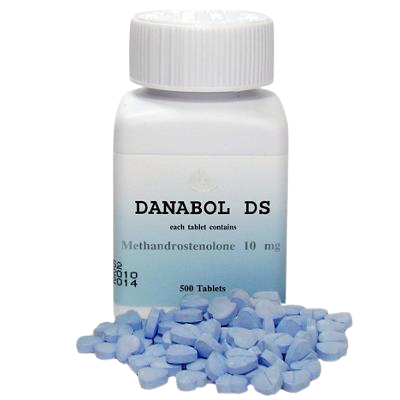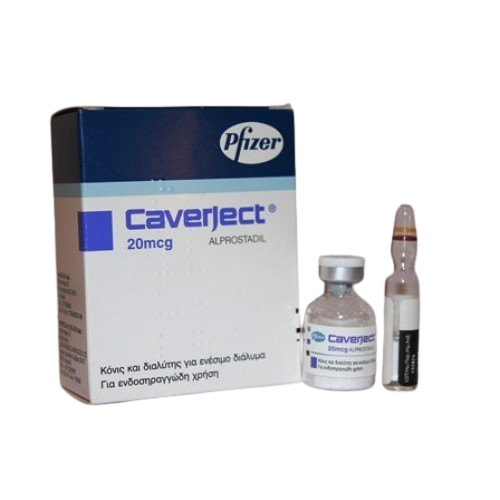Minirin 2mg 30’ct tablets Imported In Pakistan
Minirin 2mg Tablets: Overview
Minirin 2mg tablets are an imported medication used primarily for the treatment of diabetes insipidus, a condition characterized by excessive urination and thirst due to insufficient levels of antidiuretic hormone (ADH).
Active Ingredient
- Desmopressin: The active ingredient in Minirin, which is a synthetic analogue of ADH, helps to regulate urine production and maintain fluid balance in the body.
Indications
- Primary Use: Treatment of diabetes insipidus.
- Other Uses: May also be used in certain cases of nocturnal enuresis (bedwetting) in children.
Contraindications
Minirin 2mg tablets should not be used in patients with:
- Low sodium levels (hyponatremia)
- High blood pressure
- Heart problems
- Kidney impairment
- Cystic fibrosis
Precautions
Before using Minirin, consider the following:
- Allergies: Inform your doctor about any allergies.
- Kidney Disease: Use with caution in patients with kidney issues.
- Fluid Intake: Monitor fluid intake to avoid complications related to fluid retention.
Common Side Effects
Patients may experience the following side effects:
- Headache
- Nausea
- Upset stomach
- Flushing of the face
Special Considerations
- Pregnancy and Lactation: The safety of Minirin during pregnancy and breastfeeding is not well established; consult a healthcare provider before use.
Description
Minirin 2mg Tablets: Overview
Minirin 2mg tablets are an imported medication used primarily for the treatment of diabetes insipidus, a condition characterized by excessive urination and thirst due to insufficient levels of antidiuretic hormone (ADH).
Active Ingredient
- Desmopressin: The active ingredient in Minirin, which is a synthetic analogue of ADH, helps to regulate urine production and maintain fluid balance in the body.
Indications
- Primary Use: Treatment of diabetes insipidus.
- Other Uses: May also be used in certain cases of nocturnal enuresis (bedwetting) in children.
Contraindications
Minirin 2mg tablets should not be used in patients with:
- Low sodium levels (hyponatremia)
- High blood pressure
- Heart problems
- Kidney impairment
- Cystic fibrosis
Precautions
Before using Minirin, consider the following:
- Allergies: Inform your doctor about any allergies.
- Kidney Disease: Use with caution in patients with kidney issues.
- Fluid Intake: Monitor fluid intake to avoid complications related to fluid retention.
Common Side Effects
Patients may experience the following side effects:
- Headache
- Nausea
- Upset stomach
- Flushing of the face
Special Considerations
- Pregnancy and Lactation: The safety of Minirin during pregnancy and breastfeeding is not well established; consult a healthcare provider before use.
Key Benefits of Minirin 2mg Tablets
- Management of Diabetes Insipidus: Minirin is effective in treating diabetes insipidus, a condition where the body does not produce enough antidiuretic hormone (ADH), leading to excessive urination and thirst.
- Control of Nocturnal Enuresis: It helps manage bedwetting in children, reducing nighttime urine production and preventing bladder overfilling.
- Reduction of Polyuria: Minirin is beneficial for patients experiencing extreme urination (polyuria), especially after brain surgery or head injuries.
- Prevention of Dehydration: By enhancing water reabsorption in the kidneys, it helps prevent dehydration in individuals with conditions that affect ADH production.
- Anti-haemophilic Properties: Minirin can also reduce bleeding tendencies in patients with certain bleeding disorders, such as Von Willebrand’s disease, by promoting the release of blood clotting factors.
Key Ingredients
- Desmopressin: The primary active ingredient in Minirin, desmopressin is a synthetic analogue of vasopressin (the natural ADH). It mimics the action of ADH, helping to regulate urine production by reducing the amount of water eliminated in urine and increasing water reabsorption in the kidneys.
Mechanism of Action of Minirin 2mg Tablets
Minirin contains desmopressin, a synthetic analogue of the natural antidiuretic hormone (ADH), also known as vasopressin. Its mechanism of action involves the following key processes:
- Water Reabsorption: Desmopressin acts primarily on the kidneys, specifically on the collecting ducts. It enhances the reabsorption of water by increasing the permeability of the renal tubules. This results in a reduced volume of urine produced, thereby helping to manage conditions like diabetes insipidus, where the body fails to produce adequate ADH.
- Reduction of Urine Output: By mimicking the effects of natural ADH, desmopressin decreases the amount of water eliminated in the urine. This is particularly beneficial for patients with diabetes insipidus, as it helps control excessive thirst and urination.
- Management of Nocturnal Enuresis: In children, desmopressin helps decrease nighttime urine production, thus reducing bedwetting episodes. It does this by promoting water retention during the night when urine production is typically higher.
- Anti-Haemophilic Properties: Desmopressin also promotes the release of von Willebrand factor and factor VIII from endothelial cells, which can help reduce bleeding episodes in patients with certain bleeding disorders, such as hemophilia.
- Fluid Balance Regulation: The drug’s action helps maintain fluid balance in the body, which is crucial for overall health, especially in individuals with conditions that disrupt normal fluid regulation.
Chemical Structure of Minirin (Desmopressin)
Minirin contains desmopressin acetate as its active ingredient. The chemical structure of desmopressin can be described as follows:
Chemical Formula
- Molecular Formula: C₁₄H₁₉N₃O₃S
- Molecular Weight: Approximately 331.44 g/mol
Structural Characteristics
Desmopressin is a synthetic analogue of the natural hormone vasopressin and features the following structural attributes:
- Peptide Structure: Desmopressin is a cyclic peptide composed of a specific sequence of amino acids.
- Substitutions: It includes modifications such as the substitution of L-arginine with D-arginine and the desamination of cysteine.
Structural Representation
The chemical structure of desmopressin can be represented as:
textH O
\ ||
N--C
| |
H-C C--C
| |
C N
/ |
H-C C
| |
H-C C
| |
H-C C
\ |
SKey Precautions for Minirin 2mg Tablets
- Allergies: Do not use Minirin if you are allergic to any of its ingredients. Inform your healthcare provider about any known allergies.
- Medical History: Before starting treatment, disclose your complete medical history, particularly if you have:
- Severe kidney disease
- Hyponatremia (low sodium levels)
- Uncontrolled high blood pressure
- Heart problems (e.g., congestive heart failure)
- Fluid retention issues
- History of migraine headaches
- Fluid Intake: Limit your intake of water and other fluids while on Minirin to prevent fluid overload, which can lead to serious electrolyte imbalances.
- Pregnancy and Lactation: Consult your doctor if you are pregnant, planning to conceive, or breastfeeding, as the effects of Minirin during these periods are not well established.
- Drug Interactions: Inform your healthcare provider about all medications you are taking, including prescription drugs, over-the-counter medications, and herbal supplements, to avoid potential interactions.
- Caffeine and Alcohol: Avoid consuming caffeine (coffee, tea, cola, energy drinks) before bedtime, as it may increase urination. Alcohol should also be limited, as it can exacerbate side effects and increase urine production.
- Monitoring: Regular monitoring of electrolyte levels is essential to detect any imbalances while using this medication.
Dietary Restrictions
- Fluid Management:
- Limit Fluid Intake: To prevent fluid overload, restrict the amount of water and other fluids consumed, especially during the first few hours after taking Minirin.
- Caffeine:
- Avoid Before Bedtime: Refrain from drinking caffeinated beverages before bedtime to minimize the risk of increased urination at night.
- Alcohol:
- Avoid Consumption: Alcohol can worsen side effects and increase urination; thus, it should be avoided while taking Minirin.
- Balanced Diet:
- Fiber-Rich Foods: Maintain a diet rich in fiber, including fruits, vegetables, and whole grains, to support overall health.
Interaction of Minirin (Desmopressin) with Other Medications
Minirin, which contains desmopressin, has a significant potential for drug interactions. A total of 122 medications are known to interact with Minirin, categorized as follows:
- 21 major interactions
- 100 moderate interactions
- 1 minor interaction
Major Drug Interactions
Some of the major medications that may interact with Minirin include:
- Corticosteroids (e.g., prednisone, dexamethasone): These can affect fluid balance and sodium levels.
- Diuretics (e.g., furosemide, hydrochlorothiazide): These may counteract the effects of desmopressin by increasing urine output.
- Selective Serotonin Reuptake Inhibitors (SSRIs) (e.g., sertraline, fluoxetine): These can increase the risk of hyponatremia (low sodium levels).
- Tricyclic Antidepressants (e.g., amitriptyline): These may enhance the antidiuretic effect of desmopressin.
Moderate Drug Interactions
Common medications that may have moderate interactions include:
- NSAIDs (e.g., ibuprofen, naproxen): These can lead to water retention and may exacerbate the effects of desmopressin.
- Lithium: This medication can affect fluid balance and may lead to increased urination.
- Seizure medications (e.g., carbamazepine, phenytoin): These may interfere with the effectiveness of desmopressin.
Alcohol and Food Interactions
- Alcohol: Consumption should be avoided as it can increase the risk of side effects and may exacerbate urination.
- Caffeine: Avoiding caffeine before bedtime is recommended, as it may increase urination.
Precautions with Other Conditions
Minirin also has interactions with certain medical conditions, including:
- Kidney disease: Patients with compromised kidney function should use Minirin with caution.
- Hyponatremia: Individuals with low sodium levels should avoid using desmopressin due to the risk of further lowering sodium levels.
Use of Minirin (Desmopressin) During Pregnancy and Breastfeeding
Pregnancy
- Recommendation: Minirin should only be used during pregnancy if necessary. It is essential for pregnant women to consult their healthcare providers to discuss the potential risks and benefits of using this medication.
- Safety Data: Studies have indicated that desmopressin can be used safely during pregnancy to treat diabetes insipidus. A review of cases showed that while there were some instances of intrauterine growth disturbances, the overall risk of malformations was not significantly higher than the general population risk. Specifically, one study reported a risk of 3.4% for malformations in infants born to mothers treated with desmopressin, which is below the population risk of 4.5%.
- Hormonal Changes: It is noted that plasma concentrations of vasopressin (the natural hormone desmopressin mimics) can vary during pregnancy, with an increase in the third trimester, which may affect treatment efficacy and safety.
Breastfeeding
- Excretion in Milk: Desmopressin is excreted into breast milk in very low concentrations. Studies have shown that the levels of desmopressin in breast milk are negligible and unlikely to affect a breastfeeding infant.
- Caution Advised: Despite the low concentration, caution is recommended when administering desmopressin to nursing mothers. It is advised that breastfeeding should be avoided while taking Minirin, especially if the mother is receiving higher doses.
- Monitoring: If a nursing mother requires desmopressin, she should monitor her infant for any potential adverse effects, although no significant effects have been reported in nursing infants.
Dosage of Minirin (Desmopressin)
- General Dosage: The specific dosage of Minirin is determined by the prescribing physician based on the patient’s medical condition. It is typically taken as follows:
- Adults: The usual starting dose is 0.1 to 0.2 mg taken once daily, which can be adjusted based on the response.
- Children: For bedwetting, the recommended dose is usually 0.2 mg taken at bedtime.
- Administration: Minirin can be taken with or without food. It is important to swallow the tablet whole and not to chew or crush it.
- Regular Use: For optimal benefits, Minirin should be taken regularly as prescribed, and patients should not discontinue use without consulting their healthcare provider.
Storage of Minirin
- Temperature: Store Minirin at room temperature (20-25°C or 68-77°F).
- Conditions: Keep the medication away from excessive light and moisture.
- Safety: Ensure that the tablets are kept out of reach of children and pets. Do not flush medications down the toilet unless instructed.
Reviews of Minirin
- Effectiveness: Reviews indicate that Minirin is effective in managing symptoms of diabetes insipidus and reducing bedwetting in children. Users report a significant decrease in urination frequency and improvement in quality of life.
- Side Effects: Common side effects include headache, nausea, and abdominal cramps. Many users find these side effects manageable, but some report that they can be bothersome.
- Overall Satisfaction: Many patients express satisfaction with the medication’s ability to control excessive thirst and urination, highlighting its role in improving daily living conditions.
- Consultation Recommended: Users emphasize the importance of consulting healthcare providers for personalized dosage and to monitor for any potential side effects or interactions with other medications.








Reviews
There are no reviews yet.